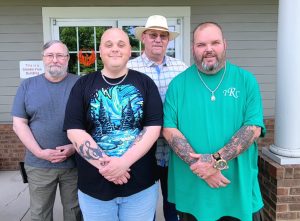By ZOË WATKINS
zwatkins@bedfordcountypost.com

From left, John Barbee, board member; Sam Hillis, counselor; Chris Clay, past president; Cody Harris, Executive Director. (Photo by Zoe Watkins)
“Everyone has a story to tell; you just have to be willing to listen.”
That is a quote written on a whiteboard at the Tony Rice Center, a drug rehabilitation facility in Shelbyville.
And it’s safe to say, listening to peoples’ stories is something the center, its 16 staff members, and its board members know how to do.
They will be expanding their facility to include a new housing unit that will hold 28 additional beds for patients going through the transitional phase of the program. They currently have 36 beds, and each is occupied.
“The key to fighting addiction is time, and the longer we can keep them in our active treatment or active recovery program, the better odds they’re going to stay sober and maintain sobriety,” said Cody Harris, TRC’s Executive Director.
Once the 28-bed transitional housing expansion is complete, those who have finished the center’s 90-day program will have the opportunity to stay and transition into a work program and remain in a structured environment.
“It’ll also be for people from Bedford County who call in and say they’re struggling and have no place to go,” said Harris. “So we’re really looking forward to getting those additional 28 beds.”
Lee Adcock Construction is doing the project.
“You want to help people who are pushing a good cause,” said Will Holt, project manager for Lee Adcock. “Addiction is a problem here and a lot of issues get swept under the rug. But a place like this, you don’t shy away from, you fix.”
It’s a common phrase that Bedford County “has a drug problem.” But facilities like the Tony Rice Center are looking to not only combat that but also provide solutions.
“Bedford County, whether they admit it or not, has got an addiction problem going on here with opioids and fentanyl,” said Harris. ”And we’re going to be here trying to fight it as long as possible.”
What they do
Specifically, the center targets people who do not have insurance.
“A lot of people with substance abuse don’t have any insurance policy,” said Harris.
They also are able to keep their patients in-house for 90 days.
Past TRC president and board member Chris Clay said, “It’s a more extensive, in-depth program than a lot of others. It’s 12-step based, and we go deeper.”
Clay himself is a recovering addict himself. “I’ve just got a desire to help,” he said. “This is the way I can help. The way it worked for me is after I had help to save my life, it gave other people the opportunity to talk to me about Christ and save my soul.”
In fact, most of the staff are also recovering addicts in long-term recovery and are alums of the Tony Rice Center.
“It helps that they get to see what recovery looks like in the staff,” said Sam Hillis, a counselor at the center.
In addition to doing recovery and relapse prevention, TRC also focuses on life-skills and showing patients how to manage on their own. And hearing those stories of recovery continues to inspire those who give their time helping others.
The center also partners with Centerstone, a local therapy group who helps target any mental illness that may be co-occurring someone’s addiction.
TRC’s success rate shouldn’t make sense on paper, but it’s high, according to Hillis. He said people will drop out of 28-day programs left and right. But for being a 90-day program, Hillis said only 35-40 of the 1,000 or so patients they have in a year will drop out.
Clay added, “They told me, when I went through treatment, that 2-out-of-7 stood a chance of staying sober. Our success rate is double that, easy.”
Even though they serve everyone from Memphis to Johnson City, they do keep Bedford County a high priority, especially since most long-term recovery facilities are located 60 miles away in Nashville.
“We serve the whole state, but we want to be a lighthouse in Bedford County,” said Hillis. They also do free consultation and offer connections for people seeking help.
Some 70-80% of their service recipients are granted to come to the center from the court systems. But they also take call-ins and prioritize IV users and the unhoused.
“Our target population is people who don’t really have a whole lot left in life,” said Hillis. “That’s our credo here: we’ll love you until you learn how to love yourself again.”
History of TRC
It began with its namesake: Tony Rice, a well-known local man who worked for the newspaper, and who is credited with bringing addiction recovery to Shelbyville.
While on a business trip in Akron, Ohio, he met Bill Wilson, the founder of AA. Inspired, he started the first AA meeting – that they know of, at least – in Tennessee. The recovery community blossomed and the AA group, the Shelbyville Group began, which is still going on today.
“That’s why we decided to name it after him because he’s kind of our tie to the 1930s recovery scene that really took America by storm,” said Hillis.
Right now, they are a male facility, but with growth, they hope to expand into starting female and juvenile facilities.
TRC has been licensed since 1990 and prior to their current location, they were located on Highway 41A. But the first building on the current property at 1300 Railroad Avenue was built in 1994. Their newest project is expected to be completed in 2025.
The Walking Horse Trainers Association recently donated $5,800 to the center, which will go towards hygiene products and promotional products. The Youth Leadership Bedford team also generated $13,000 for a center through fundraising efforts.
If you would like to donate, go to https://www.tonyricecenter.org/.
“We are so willing to work with the community in any way possible,” said Hillis.



![For-Tips-and-Ideas-Phone-300x250-Bedford-County-Post[1]](https://www.bedfordcountypost.com/wp-content/uploads/2023/09/For-Tips-and-Ideas-Phone-300x250-Bedford-County-Post1-300x250.jpg)
![Subscribe-Now-300x250-Bedford-County-Post[1]](https://www.bedfordcountypost.com/wp-content/uploads/2023/09/Subscribe-Now-300x250-Bedford-County-Post1-300x250.jpg)

